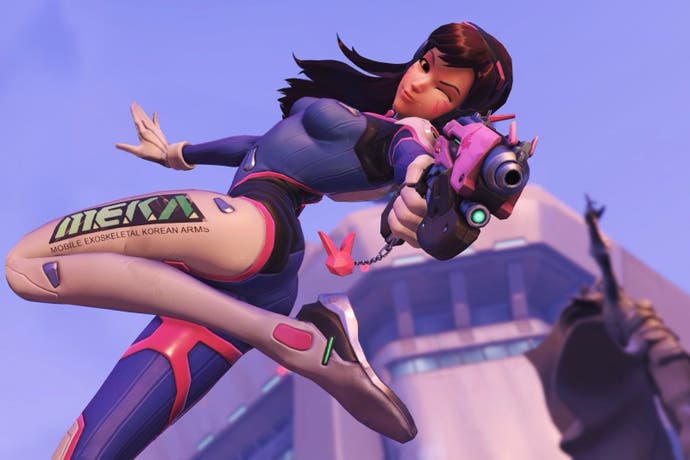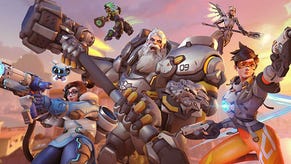Can the fundamental trouble with esports ever be properly solved?
No time to explain - Hit Points returns to Eurogamer.
Hit Points, in case you haven't come across it before, is an incredible free newsletter from friend of Eurogamer and former Edge editor Nathan Brown, delivering insight and commentary on the videogame industry. We're delighted to be partnering with Nathan to provide a platform for some of his pieces, continuing with this from earlier in the week on esport's perennial problem. If you like what you've read, do head over and subscribe!
I've been watching quite a bit of basketball lately. It's not a sport I've paid much attention to since my schooldays, when I used to play a bit. But I drifted back to it in 2020, when it was one of the first sports to find a way back from Covid, and the NBA drummed up global interest by showing games online for free. I've kept tabs on it since, and now the playoffs have started - and the football season is winding down - I've found myself getting quite into it again.
I understand the fundamentals of the sport, and over time have got my head around what in videogame terms we would call its current meta. I have no favourite team, but a few I like to watch and see win. I am starting to understand the tactical side of the game, and am beginning to parse the meanings of small parts of its arcane lexicon. I know what a pick and roll is now! I think, anyway. Please don't ask me to explain it, however.
But, as someone who has only ever watched or played the game casually, the finer details of professional basketball are lost on me. The broadcast coverage, produced for an educated US audience by TNT, ESPN and so on, understandably caters little for overseas luddites who haven't really watched the game since Michael Jordan hung up his boots, or whichever item of clothing basketball players hang up when they retire. I am often left completely confused by what just happened and why, and the commentators have very little interest in filling in the blanks. In the game I watched last night, an offensive foul was called on a player who accidentally elbowed a defender in the face during their shot motion. Moments later, the other team's star shouldered a defender in the face during his shot, but no foul was called. The commentators agreed both decisions were correct, but declined to elaborate on why. Ho hum.
This is by no means exclusive to basketball. A friend who has been going to see Arsenal since he was a boy, and who has played IRL football once a week for the past 15 years, recently learned an intricacy of the offside rule that had somehow eluded him all this time. I know how to play chess, and enjoy doing so, but when I see a match report littered with that baffling move notation that chess people use, I feel like I am having a stroke. There is an element of this in just about every form of sport, sure. But the real world's most popular sports are pretty easy to understand, and to watch. The people with the big muscles are trying to kick the ball in the net, or throw the ball through the hoop, and down the decades TV companies have worked out how to make it watchable. Sure, beginners might miss a bit of nuance, but they still understand what's going on, who is winning and stuff like that. Which brings me, after just north of 500 words towards the point of today's edition: electronic sports, or as I believe we should be calling them, 'esports'.
Last weekend I read this terrific piece on the problems of Overwatch as a sport. This is just excellent videogame coverage: a highly informed subject-matter expert telling me something I didn't know about a particular game. Some of the problems here are specific to Overwatch - in short, how some of the game's core design decisions, and Blizzard's attempts to rebalance the game around high-level competitive play, have made for a less interesting, and much less watchable sport - but there's plenty here that applies across the whole of broadcast esports.
I have never really clicked with the idea of team-based videogames as spectator sports. The very concept is a disaster for readability, the producers cutting at high speed between player perspectives and the commentators talking so fast to try and keep on top of it all I feel like I am in the unsettlingly psychedelic back room of a London club in the late 90s, and have been cornered by someone on high-grade amphetamines. When Halo Infinite's multiplayer component launched last year, I got quite into it, but as someone who'd never really played Halo online I was feeling a bit lost. I figured I'd watch some high-level competitive play for guidance. Watching all those Street Fighter tourneys doubtless made me better at the game; likewise all the Souls-series speedruns I had inhaled over the years. Surely it would be the same for Halo? Reader, it was not. The action moved so quickly, and the commentators had so little time to explain the intricacies of what the players were doing, that I'm not sure I learned a thing from the experience, except that perhaps Halo wasn't for me.
While the sheer, dizzying speed of camera cuts is I suppose inevitable, there is surely a way for the commentary desk to be a bit more accommodating to newcomers (particularly in the case of something like Halo, when a new game launch is likely to spark a surge in interest in the competitive scene). Hit Points OGs have heard this story before, but a few years back the headline Dota 2 tournament, The International, offered a separate stream for novices, promising that the commentators would tailor their coverage accordingly. Out of curiosity, I tuned in. After half an hour I quit the stream, assuming I'd clicked on the wrong one. I was completely, utterly lost.
Even my beloved Street Fighter, for all its inherent readability as a spectator sport, is terrible at bridging the gap in knowledge between invested aficionados and curious newcomers. After some time away from the game and its scene, I watched a streamed SFV tournament last week, and the commentators were making references to mechanics that had been introduced in my absence. Apparently one player's choice of V-Skill II was significant. They did not elaborate on why. Capcom's sole real concession to a beginner audience is the little terminology breakdowns it shows on screen, loading-screen tooltip-style, during breaks in play. But they are low-level, and not especially helpful, and divorced of any meaningful context. Once the action starts, you're on your own.
Esports is of course big business these days, but despite all the money flying around it is still yet to break free of the boundaries of a game's established fanbase. For years now I've been reading that this is esports' year: the moment it finally breaks through to the mainstream, the point where videogame athletes become as recognisable and revered as their counterparts in the NBA or Premier League. I'm still waiting. And until the esports industry works out how to make their product watchable, readable and, most of all, understandable for a mainstream audience, I'm afraid that wait will continue. In the meantime I shall stick to basketball, in the hope of one day ascertaining what constitutes an 'illegal screen'.
Thanks to Hit Points for allowing us to share this article. If you'd like regular free newsletters from Hit Points, don't forget to subscribe.









